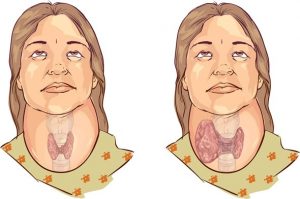Goitre is a condition that affects the normal functioning of the thyroid gland and causes it to increase in size.

The thyroid is a gland found in the neck region, directly below the Adam’s apple. This gland secretes hormones that assist in the regulation of bodily functions such as metabolism, heart rate, mood, digestion and respiration.
The basic symptom of goitre is a significant swelling on the neck. The presence of nodules in the thyroid causes it to range in size from very small to very big and may increase the appearance of swelling.

Some other symptoms can include:
- Coughing
- Difficulty breathing or swallowing
- Hoarse voice
- Feeling dizzy when arm is lifted above head.
Iodine deficiency is the major cause of goitre. Iodine plays a vital role in assisting the thyroid to produce thyroid hormones. In the absence of sufficient iodine, the thyroid works tirelessly to ensure thyroid hormone production, thus resulting into the enlargement of the gland.
Goitre can also be caused by a number of things like thyroid cancer, pregnancy, inflammation, Graves’ disease, and nodules.
There are three types of goitre that have been identified.
- Colloid: it forms due to lack of iodine. Persons with this type usually reside in areas where the mineral, iodine, is rarely available.
- Nontoxic: They are benign and do not affect thyroid function. Although its cause is yet to be discovered, it is said to be caused by medications containing lithium.
- Toxic nodular: It forms one or more little nodules as it enlarges. Hyperthyroidism then comes into the picture because the nodules work to produce their own thyroid hormones.
The greatest risk of having goitre is for those who are:
- Iodine deficient
- Have family history of thyroid-affecting issues
- Have iodine-depleting conditions
- Above the age of 40
- Pregnant or during menopause
- Having radiation therapy within the neck/chest area
After the diagnosis of goitre, it is important that the patient increases his or her iodine intake.
READ ALSO: 6 Natural and Healthy Ways To Boost Fertility




 Premier League
Premier League